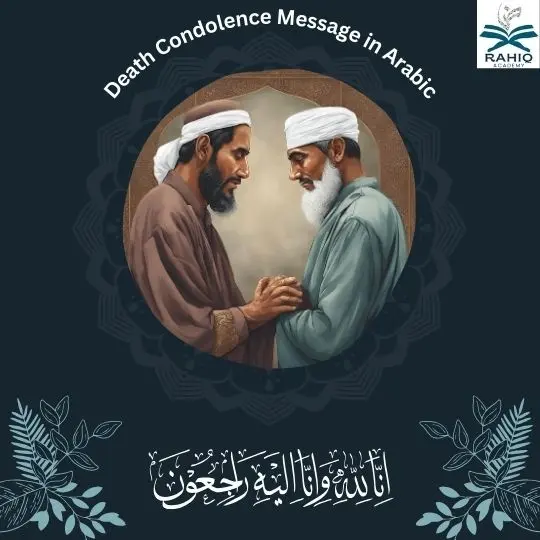Offering condolences is a deeply meaningful practice in Islam, designed to provide comfort and support to the grieving while reinforcing the belief in Allah’s will and the afterlife. Islamic condolence messages are rich in spiritual significance and often expressed in Arabic, reflecting the shared faith and hope that the deceased will find peace in the hereafter. This article will walk you through the death Condolence Message in Arabic , essential aspects of Islamic condolences, with a focus on funeral rites, mourning periods, and the appropriate expressions of sympathy.
The Funeral in Islam

The Funeral in Islam, referred to as الجنازة (Al-Janazah), is a modest and solemn event that aims to honor the deceased and allow the community to participate in prayers for the soul. A key element of the funeral process is the Salat al-Janazah (funeral prayer), which takes place after the body is washed and shrouded. This prayer is unique in that it is performed while standing and includes no bowing or prostration.
Prophet Muhammad (peace be upon him) emphasized the great spiritual reward for attending a funeral. He said:
“من شهد الجنازة حتى يُصلى عليها فله قيراط، ومن شهدها حتى تُدفن فله قيراطان”
“Whoever attends a funeral until the prayer is offered will have one qirat, and whoever attends until burial will have two qirats.”
(Sahih al-Bukhari 1325)
A qirat is likened to a massive reward, with one narration comparing it to the size of a mountain, underscoring the importance of supporting the deceased and their family.
Mourning Period: The Three Days of Mourning (العزاء)
Mourning in Islam is not just an emotional response to loss but also a reflection of faith in Allah’s decree. The typical mourning period lasts three days, known as العزاء (Al-‘Azaa’). During this time, family and friends gather to offer condolences, provide emotional support, and pray for the deceased. Islam encourages acceptance of death as part of the natural cycle of life, urging patience and reliance on Allah during difficult times.
The Prophet Muhammad (peace be upon him) said:
“لا يحل لامرأة تؤمن بالله واليوم الآخر أن تحد على ميت فوق ثلاث إلا على زوج أربعة أشهر وعشرا”
“It is not permissible for a woman who believes in Allah and the Last Day to mourn for more than three days, except for her husband, for whom she should mourn for four months and ten days.”
(Sahih al-Bukhari 1280)
While mourning is allowed for three days, Islam discourages excessive expressions of grief, such as wailing or tearing clothes. These actions can lead to a loss of composure and detract from the principle of accepting Allah’s will.
Widows, however, observe a longer mourning period known as Iddah, lasting four months and ten days. This period allows the widow time to grieve and adjust to life without her spouse, following the rules set forth in the Quran:
“وَالَّذِينَ يُتَوَفَّوْنَ مِنكُمْ وَيَذَرُونَ أَزْوَاجًا يَتَرَبَّصْنَ بِأَنفُسِهِنَّ أَرْبَعَةَ أَشْهُرٍ وَعَشْرًا”
“And those who are taken in death among you and leave wives behind—they (the wives) shall wait four months and ten days”
(Surah Al-Baqarah, 2:234)
How to Offer Condolences (التعازي)

Offering condolences, or التعازي (Al-Ta’ziyah), in Islam is a way to express sympathy and offer spiritual support. It’s common to say “إنا لله وإنا إليه راجعون”, meaning “Indeed, we belong to Allah, and indeed to Him we will return” (Surah Al-Baqarah, 2:156).
This phrase serves as a reminder that life is temporary, and every soul will return to its Creator.
Another common supplication is:
“اللهم اغفر له وارحمه وعافه واعف عنه”
“O Allah, forgive him, have mercy on him, pardon him, and forgive him.”
These phrases are deeply rooted in the belief that death is not the end but the beginning of the soul’s journey to the afterlife. Condolences can be given verbally, in writing, or in person, depending on what is appropriate for the situation.
For non-Muslims, expressing sympathy is also encouraged, although the religious phrases should be adapted. Suitable phrases include, “I’m deeply sorry for your loss,” or “May you find peace and comfort during this difficult time.”
Conclusion
Offering condolences in the Islamic tradition is not just a formality but a heartfelt act of compassion that brings comfort to the grieving while reminding them of Allah’s wisdom and mercy. Whether you’re attending a funeral, participating in the three days of mourning, or offering a simple condolence message, these practices are rooted in Islamic teachings that emphasize patience, faith, and community support.
At Rahiq Academy, we are dedicated to helping individuals deepen their understanding of Islamic traditions, including important aspects of life such as death and mourning. Join our courses to explore more about the Quran, Islamic studies, and the Arabic language. Visit Rahiq Academy to learn more.




